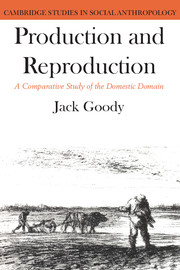Book contents
- Frontmatter
- Contents
- Tables
- Figures
- Preface
- Acknowledgements
- 1 The evolution of the domestic economy: the hoe and the plough
- 2 The theory, the variables and a test
- 3 Making causal inferences
- 4 Farming, labour and sex
- 5 Concubines and co-wives: the structure of roles in Africa and Eurasia
- 6 Adoption in cross-cultural perspective
- 7 Strategies of heirship
- 8 Class and marriage
- 9 Retrospect
- Appendix 1 Tables
- Appendix 2 The probability of family distributions
- Notes
- References
- Index
4 - Farming, labour and sex
Published online by Cambridge University Press: 05 June 2012
- Frontmatter
- Contents
- Tables
- Figures
- Preface
- Acknowledgements
- 1 The evolution of the domestic economy: the hoe and the plough
- 2 The theory, the variables and a test
- 3 Making causal inferences
- 4 Farming, labour and sex
- 5 Concubines and co-wives: the structure of roles in Africa and Eurasia
- 6 Adoption in cross-cultural perspective
- 7 Strategies of heirship
- 8 Class and marriage
- 9 Retrospect
- Appendix 1 Tables
- Appendix 2 The probability of family distributions
- Notes
- References
- Index
Summary
The relationship between these broad aspects of human societies, linking certain facets of the economic, political and kinship systems, has received some support in a study emanating from a different quarter and using different sources. This is Ester Boserup's work, The Role of Women in Economic Development (1970) which examines national and regional data collected from U.N., governmental and other agencies. A second study, by Germaine Tillion, and entitled Le Harem et les cousins (1966) is more impressionistic, being based upon the author's own fieldwork among the Berber and her wider acquaintance with the Mediterranean area. A central concern of both authors is the role of women under different socio-economic conditions.
The distinction between systems with diverging devolution and those with homogeneous transmission corresponds in some respect to that between the presence of dowry and bridewealth, or, to put the matter more precisely, the presence of each of these forms of marital transaction is consistent with their counterparts at the level of inheritance. It is also consistent with the distinction between endogamic and exogamic systems of marriage to which Germaine Tillion called attention (Tillion, 1966; Michel, 1972).
Tillion contrasts the exogamic nature of ‘savage’ society, characterised by populations of low density, scattered throughout the world at some distance from each other and now in the process of disappearing, with the prolific endogamous societies distributed around the borders of the Mediterranean.
- Type
- Chapter
- Information
- Production and ReproductionA Comparative Study of the Domestic Domain, pp. 31 - 40Publisher: Cambridge University PressPrint publication year: 1977

